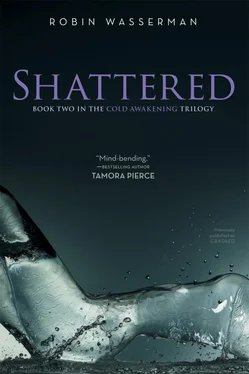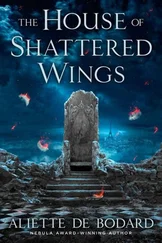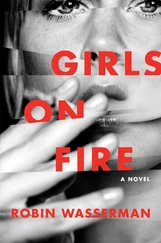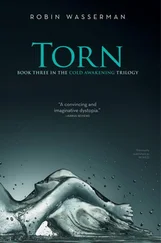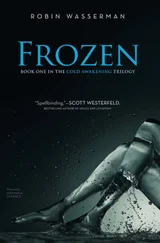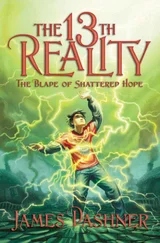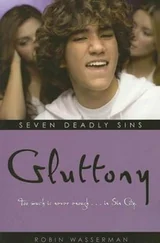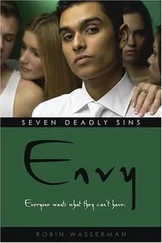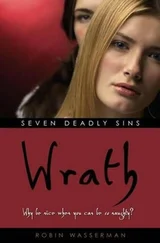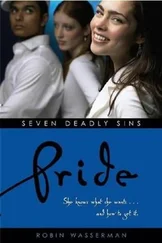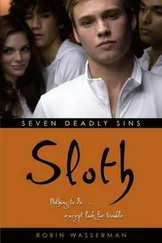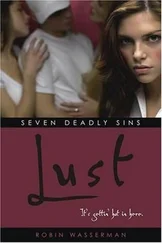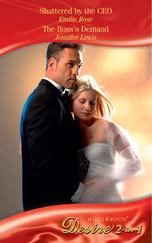“Depressing?” he suggested.
I shook my head. “I know it should be, but somehow it’s just—”
“Not,” he said with me. Our arms swung in time together, close enough that our sleeves brushed and, once, the backs of our hands. Like the water had loosened something in him, Riley talked. “It’s the first place that’s ever belonged to just me. It’s big here, you know? No walls. And even down there, under the water…” He knotted his hands together, then released them. “The city was never like that for me. Before. It’s quiet. Safe. Like you said. Being alone in the world. That’s why I come.” He glanced at me and risked a shy smile. “I never brought anyone here before.”
“Not even Jude?”
He shook his head.
I wanted to ask why. But I was starting to get a feel for Riley: He’d tell me when he wanted to. Until then, there was no point in asking. “So how long have you guys actually been friends?”
He looked like he’d never thought about it before. “He’s just always been there. Since we were kids.”
“But you guys are so different,” I said.
He shook his head. “Not so different. We come from the same place. That matters. When it’s hard…” He sloshed his foot through the sludge lapping at the shore. “You find out who you can count on.”
“So what were you like?” I asked. “Before.”
“Different.” He crossed his arms, brushed his hands up and down his biceps, rough, like he was trying to wipe off the skin. “You saw the pic. You know.”
Black instead of white; org instead of mech. “Your face was the same,” I said. “I mean, not—Obviously it’s not the same face. But something about the expression.” I had a sudden impulse to touch his face, to show him what I was talking about, the way his mouth set in a permanent frown, the way his lids hung heavy over his eyes, like he was half asleep, or like he just didn’t want to see. “Ani told me what happened to kids in her city, the ones who were… sick,” I said, thinking of predownload Jude, org Jude, trapped in his ruined org body, sunken cheeks and useless legs. “Was Jude…?”
Riley didn’t answer. He turned away from me, staring out at the ocean. It was gray in the dimming light, fading into the sky. “Jude wasn’t sick,” he said quietly, glancing over his shoulder as he always did when he neared the edges of Jude’s secrets. “He wasn’t born that way. It happened when we were six or seven. Older kids. They—” He walked faster, still watching the water. “I was there, but I wasn’t big enough to stop them. It just happened, and then it was over. He almost died.”
“You took care of him after that,” I guessed. “He needed you.”
Riley shook his head. “I needed him. He figured things out. He’s smart—”
“Not as smart as he thinks.”
“Smart enough,” Riley said. “He got us food, got us power. Kept us safe. I’m the one who screwed things up. And when I did…” He held his hand in front of his face, turning it over as if he’d never seen it before. Searching his fingertips like he was looking for imperfections. Or maybe for prints, the identifying whorls and eddies that mechs did without. “He figured out a way to fix that too.”
“ He got you into the download program?” I said, disgusted. “Just so he wouldn’t have to go through it alone?”
“I got shot,” Riley said flatly. “And thanks to Jude, I got a choice. Death or…”
“This.”
“They didn’t tell me what I was choosing,” Riley said. “They didn’t tell me I’d be like this. Or that I’d look like this. They didn’t tell me I could never go home.”
“Why would you want to?”
Riley’s face was blank. “I don’t.”
We reached the fence and climbed over, carefully this time, returning to civilization. The crowds milling through the memorial plaza had mostly dispersed, but we still skirted the edges, keeping our faces averted from the orgs. I paused for a moment in front of a glass sculpture of an antelope, its antlers sparkling in the light like the memorial spires. The golden plaque stretched across its flank marked it as one of the Committee for Animal Remembrance and Education’s extinction tributes. At every testament to loss of human life, CARE erected one of its own statues, ever-present reminders that, as the plaque said, “In the midst of our human sorrow, let us never lose sight of the greater tragedy, the death of millions, innocent victims of civilization.” And then, as the list of extinguished species—the endless Latin names for bears and squirrels and deer and apes, even the ones who’d been repopulated in genetically modified form—scrolled across the LED screen, their final battle cry: As cities fall, may nature rise again .
There’d been riots, back when CARE had first started planting these things around dead zones like they were glad to see all those hundreds of thousands of humans knocked out of the way so the animals could return. But by now they were just background noise. It had been years since I’d actually stopped to read the list of names, to rest my hand against the cool glass head of a fantastical animal and wonder if it had been as beautiful in life as the sculptor had rendered it in death. That was the thing about the Windows of Memory, about all these memorials. They made death into something elegant and clean. Even—if you were stuck on a field trip—something boring. They cleared out the bodies, dumped them in another section of the underwater city, sanitized death to make it safe for the living.
“If mechs ever went extinct, you think someone would build one of these for us?” I asked Riley as we began walking again.
“You ask Jude, eventually we’ll be building one for them ,” Riley said. I glanced up at his face, trying to figure out if he was joking. He caught my eye and held it. There was something too intense in his gaze, like he was seeing something he wasn’t supposed to, and I wanted to look away. Which is why I didn’t.
Which is how I almost stepped on the baby.
I screamed.
“What?” Riley asked, alarmed.
“Nothing.” It’s not alive , I assured myself, picking up the wriggling, crying doll. Some new trend in realistic toys, though I didn’t know what kid would want to deal with a squalling infant that stared up at you with creepy blinking eyes, drooled yellowish saliva, and from the feel of the thing, wet its diaper.
“Some kid must have dropped it,” Riley said.
The baby’s flesh was soft and pliant, almost lifelike, just like ours. Maybe they’d used the same material.
I pictured Zo and me as little kids, playing house, Mommy and Daddy to a bedful of dolls less advanced but just as creepy as this one. And suddenly I wanted to throw the baby as far as I could.
It’s as close as I’ll ever get, I thought. Playing house. Mech mommy. Mech daddy. And our mech baby.
The doll dropped out of my hands. The impact bumped its screeching up another decibel. Somewhere nearby, a child’s piercing scream added to the fun. “You hurt her!” the kid shouted, running up to us on short, chubby legs. Brown pigtails flew out behind her. The Mickey T-shirt marked her as a student at one of the Disney elementaries. Surprising, since the doll was a generic. I’d always heard the Disney kids couldn’t play with anything but corp-approved toys.
Riley picked up the doll and offered it to her. “What’s your name?” he asked.
She burst into tears. Angry tears spurting out of swollen eyes, streaking down her bulging red cheeks. She squinched up her eyes and nose into a little old man face and began emitting a sirenlike wail, the noise cut short every few seconds as she drew in a loud, gasping breath, just enough air for another round.
Читать дальше
